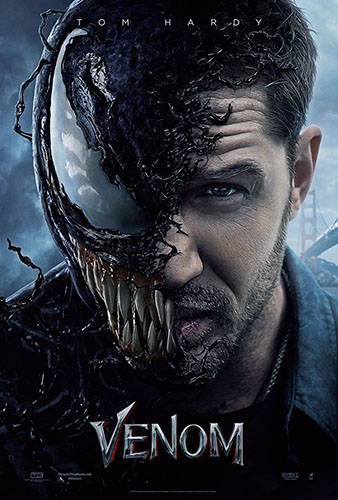![]() I walked out of “Venom” with the dopiest smile on my face. It’s slightly disorienting that “Venom,” which in its promotional materials leans in heavily, too heavily, on its dark-action-oriented premise, is least effective when it works at being a superhero/action movie. Of course, “Venom” is an anomaly. Despite being based on a Marvel Comics’ character, Venom is not part of the extended Marvel Cinematic Universe from Marvel Studios (that includes last year’s “Spider-Man: Homecoming”), but rather the first in what’s expected to be a series of Sony-produced Marvel-inspired films that include the characters from the Spider-Man Universe, except for Spider-Man, who is currently part of the extended Marvel Comics Universe. (The battle between Sony and Marvel battling for rights to Spiderman is as fascinating as it is confusing, buoyed by ambiguous statement from Sony’s Amy Pascal and Marvel Studios’ Kevin Feige as to whether or not Venom is part of Holland’s Spiderman Universe.)
I walked out of “Venom” with the dopiest smile on my face. It’s slightly disorienting that “Venom,” which in its promotional materials leans in heavily, too heavily, on its dark-action-oriented premise, is least effective when it works at being a superhero/action movie. Of course, “Venom” is an anomaly. Despite being based on a Marvel Comics’ character, Venom is not part of the extended Marvel Cinematic Universe from Marvel Studios (that includes last year’s “Spider-Man: Homecoming”), but rather the first in what’s expected to be a series of Sony-produced Marvel-inspired films that include the characters from the Spider-Man Universe, except for Spider-Man, who is currently part of the extended Marvel Comics Universe. (The battle between Sony and Marvel battling for rights to Spiderman is as fascinating as it is confusing, buoyed by ambiguous statement from Sony’s Amy Pascal and Marvel Studios’ Kevin Feige as to whether or not Venom is part of Holland’s Spiderman Universe.)
So, who exactly needs “Venom” in a superhero world already overwhelmed by the exploits of Marvel’s Avengers and DC’s Justice League? What does Sony have to contribute to the superhero film genre? It’s that difficulty of placing the purpose of “Venom” in a larger scale that I suspect has had so many scratching their heads, trying to identify a point to it all. Except, it is this outlier quality of “Venom” that the film effectively harnesses to deliver a superhero that is perhaps less effective at being a superhero, but it is relentlessly rewarding at being something else altogether. For “Venom” works best not when measured in the comic book ethos but as a chaotic and bizarre and relentlessly personable shaggy dog of a comedic character study. For that dopey smile I mentioned earlier? I can’t think of another live-action superhero film that ended on just the right beat to emphasise its casual humour rather than its real-world import.

